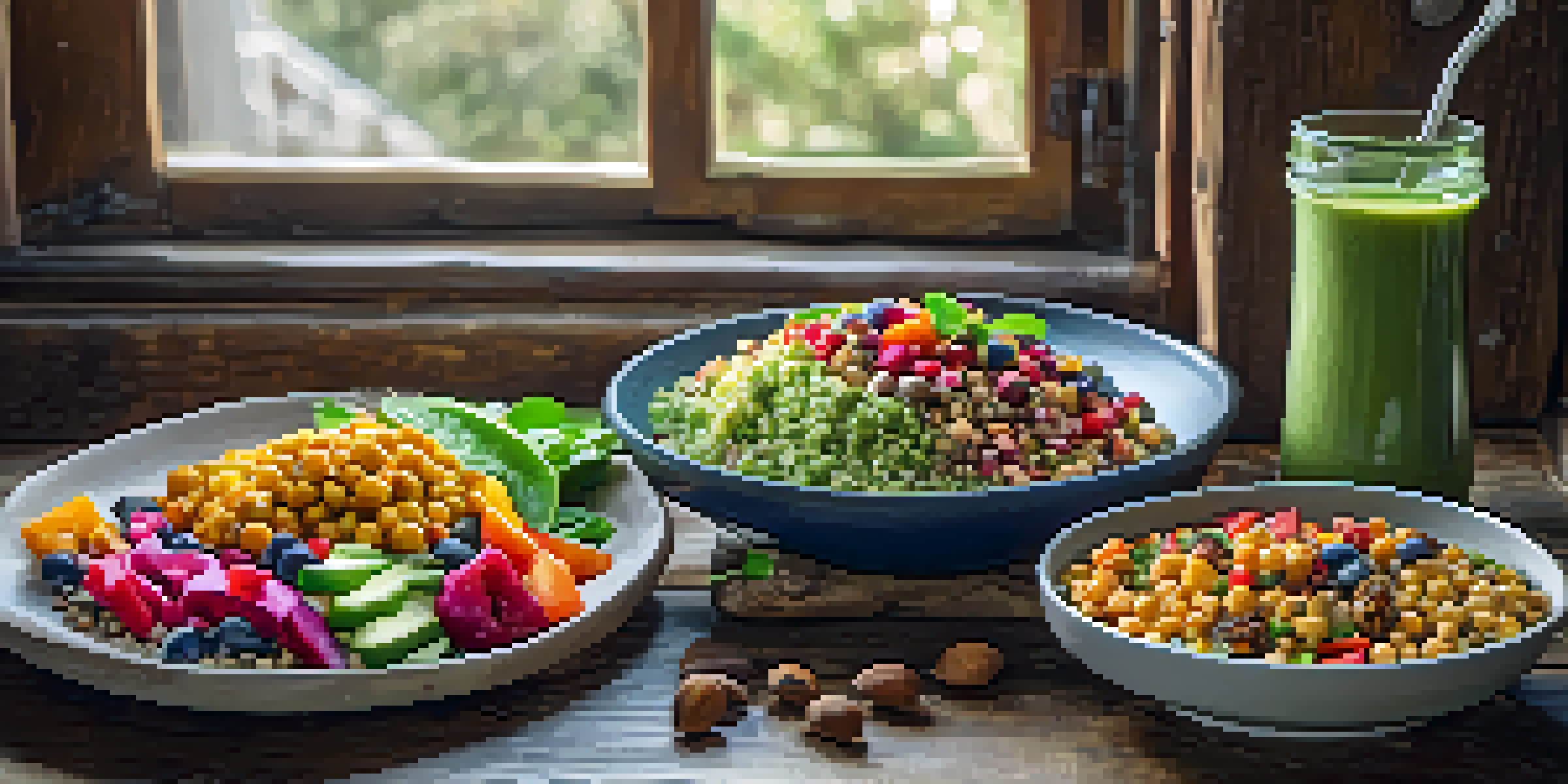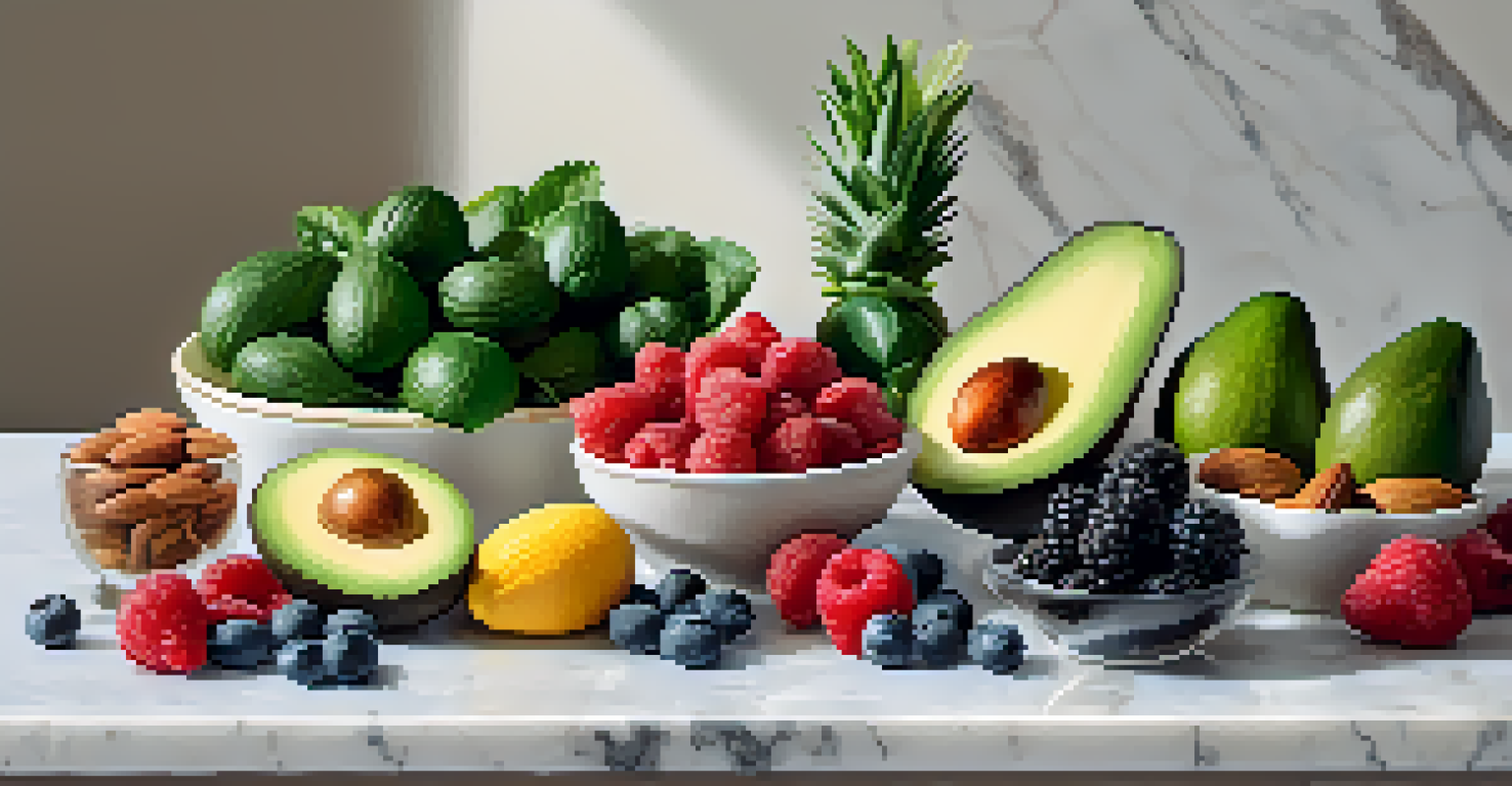Vegan Food for Heart Health: A Complete Guide to Benefits

Understanding Heart Health and Diet Choices
Heart health is influenced by various factors, including diet. A well-balanced diet can significantly lower the risk of heart disease. When we think of heart health, we often picture foods rich in omega-3 fatty acids or antioxidants, and vegan foods can provide plenty of these.
Let food be thy medicine and medicine be thy food.
Foods like leafy greens, nuts, and whole grains are staples in a vegan diet and contribute to better heart health. They are packed with essential nutrients that help reduce cholesterol levels and lower blood pressure. Moreover, a diet rich in fruits and vegetables is associated with a reduced risk of heart disease.
Understanding how these foods work together to support your heart can empower you to make healthier choices. Transitioning to a vegan diet can feel overwhelming, but knowing the benefits can motivate you to take the leap.
Key Nutrients in Vegan Diets for Heart Health
A vegan diet offers a wealth of heart-healthy nutrients. For instance, fiber is abundant in plant-based foods and plays a crucial role in lowering cholesterol. Foods like oats, beans, and lentils are fantastic sources that can help keep your heart in tip-top shape.

Antioxidants, often found in colorful fruits and vegetables, can combat oxidative stress and inflammation in the body. Berries, spinach, and carrots are all excellent choices that contribute to overall cardiovascular health. By incorporating a variety of these foods, you can ensure you’re getting a broad spectrum of nutrients.
Vegan Diet Supports Heart Health
A well-balanced vegan diet rich in fiber, antioxidants, and healthy fats can significantly lower the risk of heart disease.
Additionally, healthy fats from sources like avocados and nuts can help improve cholesterol levels. These fats, when included in moderation, are beneficial to heart health and can easily fit into a vegan diet.
The Role of Fiber in Heart Disease Prevention
Fiber is often touted as a superhero for heart health, and for good reason. It aids in lowering bad cholesterol (LDL) and helps maintain a healthy weight, both of which are critical in preventing heart disease. A diet high in fiber can also improve digestion and promote a sense of fullness.
You are what you eat, so don't be fast, cheap, easy, or fake.
Vegan sources of fiber include fruits, vegetables, whole grains, and legumes. For example, a simple bowl of oatmeal topped with berries can give you a fiber boost while being delicious. When you fill your plate with these fiber-rich foods, you're doing your heart a favor.
Moreover, studies suggest that a high-fiber diet can reduce the risk of heart disease by as much as 25%. This means that incorporating more fiber into your meals could significantly impact your heart health over time.
Antioxidants: Nature's Defense Against Heart Disease
Antioxidants are compounds that help protect your body from damage caused by free radicals. In the context of heart health, they can help reduce inflammation and prevent artery damage. Many plant-based foods are rich in antioxidants, making a vegan diet a powerful ally for your heart.
Fruits like blueberries, strawberries, and dark chocolate are not only delicious but also packed with antioxidants. Incorporating these into your daily meals can be both enjoyable and beneficial. For instance, a smoothie with spinach and berries can be a tasty way to boost your antioxidant intake.
Key Nutrients for Heart Wellness
Essential nutrients like fiber, antioxidants, and healthy fats found in plant-based foods are crucial for maintaining cardiovascular health.
Research shows that diets high in antioxidants can lower the risk of heart disease significantly. So, by choosing a variety of colorful plant foods, you're not just eating healthy; you're also fortifying your heart against potential issues.
Healthy Fats: The Good and the Bad
Not all fats are created equal, and understanding this is vital for heart health. While saturated and trans fats can lead to heart disease, healthy fats found in plant foods can actually help improve heart function. This is where a vegan diet shines, as it naturally limits the intake of harmful fats.
Sources of healthy fats include avocados, nuts, seeds, and olive oil. These foods provide essential fatty acids that support heart health by lowering bad cholesterol and reducing inflammation. For example, adding a handful of almonds to your salad can enhance both flavor and nutritional value.
By making conscious choices about the fats you consume, you can significantly impact your heart's well-being. Embracing healthy fats in your vegan diet can lead to a heart that feels as good as it looks.
Vegan Meal Ideas for Heart Health
Creating heart-healthy vegan meals doesn't have to be complicated. Simple dishes like quinoa salad with mixed vegetables or a chickpea curry can be both satisfying and nutritious. These meals are typically rich in fiber, antioxidants, and healthy fats, making them perfect for heart health.
Another delicious option is a smoothie bowl topped with fruits, nuts, and seeds. This not only tastes great but also provides a powerhouse of nutrients that support your heart. Remember, variety is key, so don't hesitate to experiment with different ingredients to keep your meals exciting.
Transitioning to Vegan Made Easy
Gradually incorporating more plant-based meals and educating yourself about vegan nutrition can simplify the transition to a heart-healthy diet.
Planning your meals around whole, unprocessed foods can help ensure you're getting the nutrients your heart needs. With a little creativity, you can enjoy flavorful dishes while reaping the benefits for your cardiovascular health.
Tips for Transitioning to a Heart-Healthy Vegan Diet
Transitioning to a vegan diet can feel daunting, but it can be made easier with some practical tips. Start by gradually incorporating more plant-based meals into your week. This could mean having a meatless Monday or swapping out dairy for nut-based alternatives.
Educating yourself about vegan nutrition is also crucial. Understanding what nutrients you need to prioritize will help you make informed choices. For instance, be sure to include sources of protein, iron, and vitamin B12 in your diet to maintain overall health.

Lastly, don't forget to enjoy the process! Experiment with new recipes and flavors, and connect with others in the vegan community. By taking small steps and celebrating your progress, you'll find a sustainable way to eat for heart health.